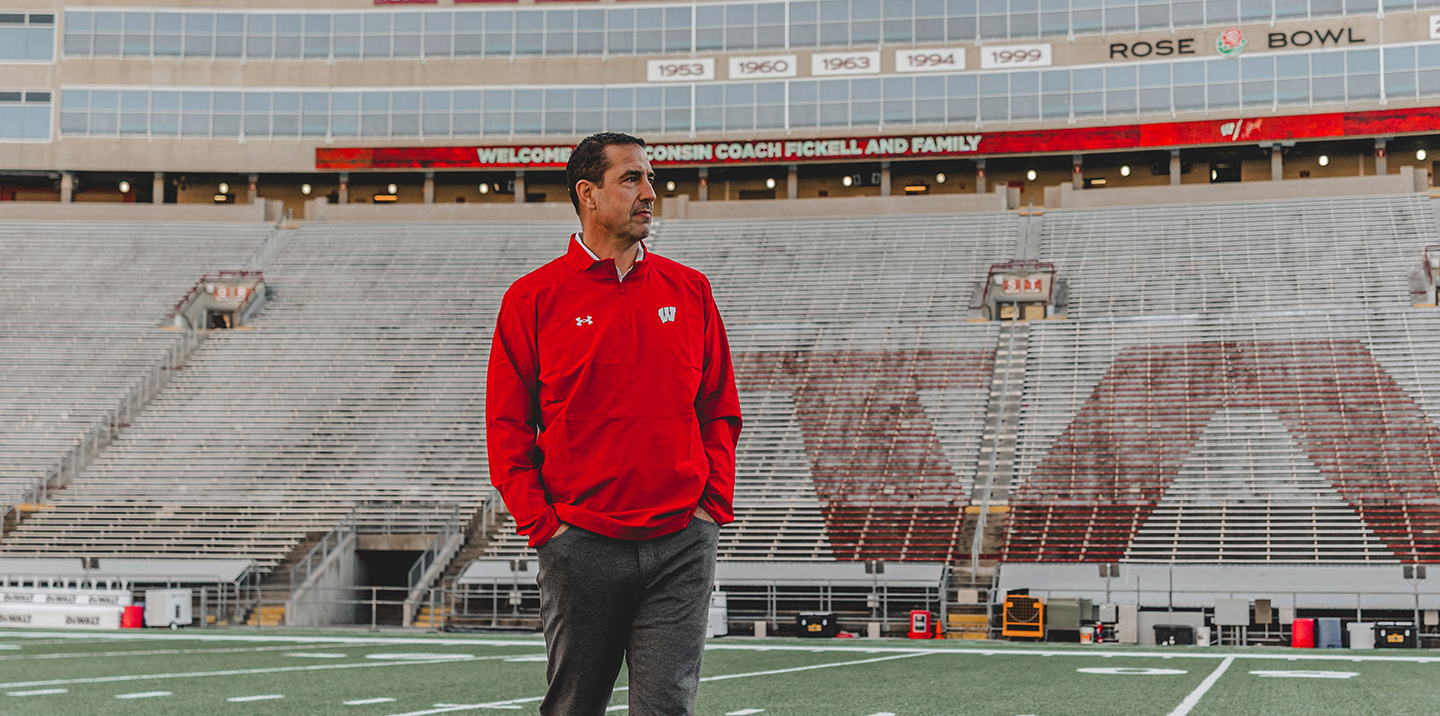
“I’m Going to Be Intense”
How head coach Luke Fickell will transform Badger football
Luke Fickell is, in a word, intense.
Ask any player how he’d describe Coach Fick, and invariably the answer is just that: intense. Talk to the new head coach of Wisconsin football, and you’ll quickly get the same impression. Whether it’s the unwavering eye contact or the permanent urgency in his voice, he has a way of making everything else in the world but the matter at hand feel small. It’s a trait that has helped him become one of the country’s most successful college football coaches.
Big Ten, Meet the Air Raid Offense
Coach Luke Fickell has brought on former North Carolina offensive coordinator Phil Longo to transform the Wisconsin offense with the Air Raid system. More of a philosophy than a playbook, it empowers players to use their instincts to attack whatever a defense is showing them.
Before the snap, often at a dizzying no-huddle pace, the Air Raid stretches the defense horizontally with the quarterback spaced out of a shotgun behind the center, flanked sideline to sideline by four receivers. After the snap, it stretches the defense vertically with the receivers carrying out a simple mandate: “chasing grass.”
“We give the players a lot of flexibility with regard to where they break routes off,” Longo says. “We’re not going to draw a post route in a playbook. We don’t have a playbook. And this is why — the post route could be run at four different angles [depending on how the defense is positioned]. We’re going to run where the grass is, not where the defenders are.”
The same approach applies to the run game. “You line seven guys up over here on the right, we’ll go run to the left. It’s not that complicated,” Longo says.
A misconception of Longo’s Air Raid is that it prioritizes the passing game. He likes to point to North Carolina’s 2020 season. When Wake Forest stacked defenders at the line to shut down the run game, Longo’s Tarheels threw for 550 yards and scored 59 points. Three games later, Miami dropped more players back in coverage to slow North Carolina’s passing game. The Tarheels offense ran for 554 yards and scored 62 points.
“We have to have the ability to take what they give us every week,” says Longo, who’s also coached high-powered offenses at Ole Miss and Sam Houston State. “Balance to us has nothing to do with how many runs and how many passes. It has everything to do with being able to spread the ball so the defense has to defend the entire field and all of your skill players.”
Longo first studied the Air Raid offense on a VCR when its founding fathers, Hal Mumme and Mike Leach, ran the concept at Kentucky in the late 1990s. As a true believer and early adopter, Longo befriended Leach and gained one of college football’s most colorful characters as a mentor. Leach died last December, just days after Longo broke the news to him about Wisconsin’s job offer.
“He wasn’t an overly emotional guy,” Longo says. “So when I told him that I took the job with Coach Fickell at Wisconsin, I was a little surprised at how fired up he was. I said to him, ‘We’re going to the Big Ten, and we’re bringing the Air Raid.’ ”
— P.S.
“Losing is not an option,” says Wisconsin center Jake Renfro x’24, who’s followed Fickell from the University of Cincinnati as a transfer player. “If you watch him at practice, especially during the inside run, you’ll see that competitive nature come out of him — it’s almost like he wants to hop in at noseguard. The fans will see it on Saturdays.”
UW athletic director Chris McIntosh ’04, MS’19 hired Fickell in November to usher in a new era of Badger football following a three-season slide toward mediocrity. The announcement made a splash nationally, and not simply because Wisconsin landed the 2021 consensus National Coach of the Year who had recently rebuffed prominent offers elsewhere. (ESPN called the hiring “one of the most eye-opening moves” of the year.) It also signaled a major pivot for the program, which has largely sustained success by following Barry Alvarez’s coaching playbook and recruiting philosophies since 1990. Even after a disappointing 7–6 record last season, Wisconsin is still one of only nine teams in the country to have won 90 or more games in the last 10 years.
Alvarez retired in 2021 after three decades of serving in the roles of head football coach, athletic director, and, on a few occasions, both. He and his handpicked coaching successors recruited mammoth linemen and brawny running backs to establish an up-the-gut, ground-and-pound style that’s become synonymous with Wisconsin football. And while they vow to stick to many of Wisconsin’s traditional strengths, Fickell and his coaching staff are installing a new defense and a spread-it-out Air Raid offense. Welcome to a new era, indeed.
At his introductory press conference, Fickell said that he only has one goal for this season and for every season: “to play for a championship.”
You may be tempted to write that off as cliché coach-speak, but Fickell makes you believe it. Because he’s done it before — with a team no one saw coming.
“You’re Going to Dislike Me Sometimes”
Fickell arrived at Madison late last year to help the Badgers prepare for their Guaranteed Rate Bowl postseason game. It was technically his Wisconsin coaching debut — a 24–17 win over Oklahoma State — but he allowed interim head coach Jim Leonhard ’06 to handle the main duties and finish the year on his own terms.
“The beautiful thing is the culture is deep-rooted here,” Fickell says. “That’s what I really learned in the first month. I don’t need to come in and try to swing a big hammer and say, ‘We’re going to change the culture.’ ”
That’s not always the case, Fickell adds. When he started at Cincinnati in 2017, he chose the big hammer. Fickell took over the program from Tommy Tuberville, now a U.S. senator from Alabama. Tuberville resigned from Cincinnati after a tumultuous 4–8 season that saw him tell a heckling fan to “go to hell.”
“If you watch him at practice, especially during the inside run, you’ll see that competitive nature come out of him,” says center Jake Renfro. “It’s almost like he wants to hop in at noseguard. The fans will see it on Saturdays.”
Fickell’s first swing of the hammer was “attention training” — the euphemism for a football bootcamp drilled by head strength coach Brady Collins, whom Fickell has brought along to Wisconsin. The goal was to restore attention to detail and reset the program. The players suddenly had a 5 a.m. wake-up call, never knowing what the next outdoor workout in freezing temperatures would entail. They crawled through the snow of late winter and rolled through the mud of early spring. Fickell was sending a clear message of expectations for the program moving forward: mental and physical toughness, intensity, hard work, consistency, perfection.
“He’s hard on the players,” says Phil Longo, the UW’s new offensive coordinator. “He coaches them hard, but he respects them tremendously. He cares about them, and they know that. And that’s why they’re willing to return the favor. You can get the most out of somebody when they know you care about them.”
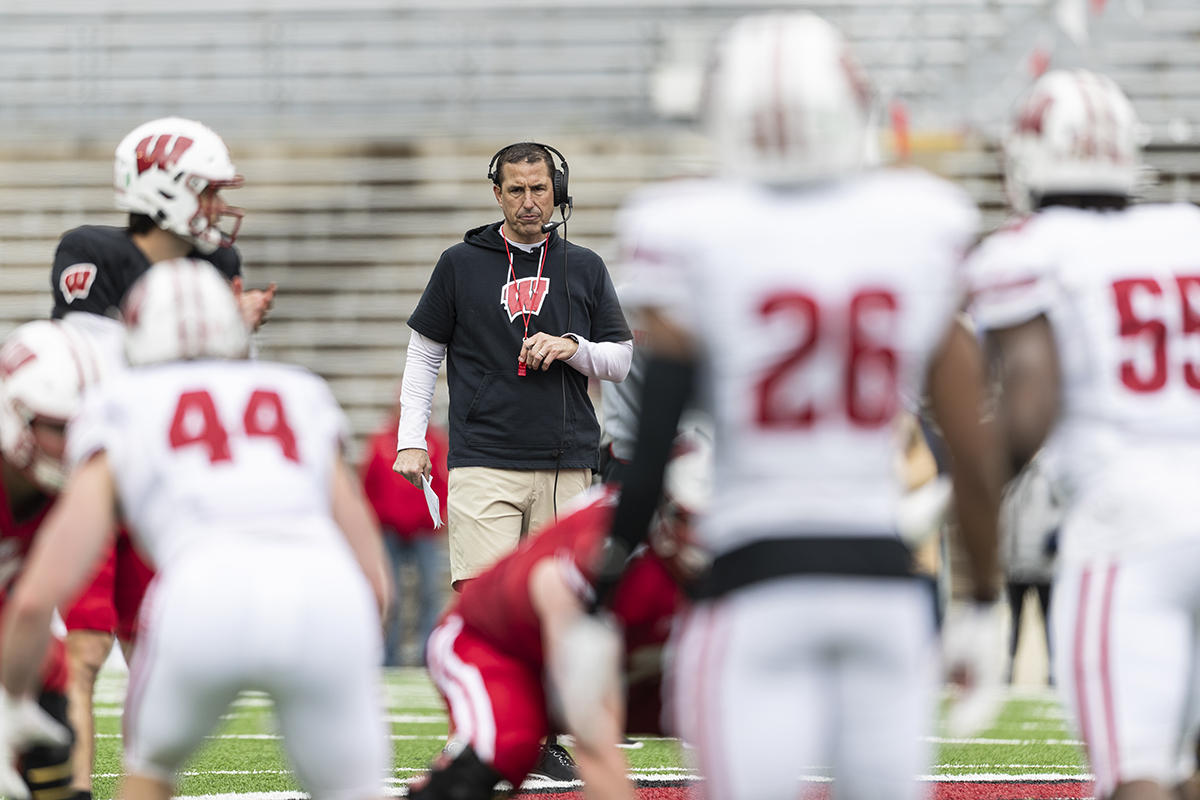
Fickell has only one goal for this season and for every season: “to play for a championship.” Taylor Wolfram
It’s hard to argue with Fickell’s form of hard coaching. The Bearcats transformed from a 4–8 team his first season to winning 11 games in consecutive years. Those were followed by back-to-back undefeated regular seasons in 2020 and 2021, the latter landing Cincinnati in the four-team College Football Playoff — the first team from outside of the five traditional power conferences to ever qualify for the tournament. (Cincinnati has since joined the Big 12 Conference, in part thanks to Fickell’s success.) Fickell became the winningest coach at Cincinnati with a 57–18 record.
“The greatest thing that we had was consistency in our core nucleus of coaches,” Fickell says. “There was never a change in voice, and there was never a change in expectations. Never. Consistency gives you a chance to go from average, to good, to really good, to maybe even great.”
Over six seasons, Fickell developed 19 Bearcats into NFL draft picks. Only one of a record nine Cincinnati players selected in the 2022 NFL Draft was rated higher than a three-star recruit coming out of high school, demonstrating Fickell’s ability to discover and cultivate overlooked talent.
“If you want to be the best version of yourself possible, on the field, off the field, in every aspect of life, you want to be with a guy like Coach Fickell,” says Renfro, a lightly recruited three-star lineman who turned into an all-conference center at Cincinnati. “He brings it out of you. He does what he says he’s going to do, and I respect him for that. Everything that man preaches and teaches comes true.”
For Fickell, the key to recruiting and developing players is building honest relationships from the very first conversation.
“I tell them in recruiting, ‘This is who I am. I’m going to be intense. I’m not going to ever let you relax and rest. I’m going to be on your ass. You’re going to dislike me sometimes. But I promise you I’ve got the best intention,’ ” Fickell says. “And if you’re honest with them — when your relationship isn’t built on BS and being best buddies in the recruitment process — then they don’t see this big change when they get here. And you hope they feel the authenticity and they can trust you.”
For someone who’s perfected this winning formula, it’s a wonder that Fickell once wrote off head coaching altogether.
A Wrestling Phenom
When Fickell moved to Madison, it marked just the second time in his life that he became a permanent resident anywhere outside of Ohio. The first was his rookie season as an NFL player with the New Orleans Saints.
Before he became a Badger, Fickell was a Buckeye through and through. He was born in Columbus, the oldest of three kids. His mother, Sharon, was a beautician; his father, Pat, worked for the railyard. His father and uncle coached amateur wrestling, which prompted Fickell to step on the mat at the age of five. By high school, he was a local wrestling phenom. After losing four matches his freshman year, he never lost again — famously reeling off 106 consecutive wins for St. Francis DeSales High School. Several of his opponents forfeited matches for fear of humiliation.
Fickell credits his tunnel-vision approach to life to his wrestling background. A sign of his competitiveness, those four wrestling losses still motivate him today. One was to a wrestler at Perrysburg High. Years later, he was asked to give a speech at the school to local standout football players. He did it, but with one condition: he wouldn’t go inside the school.
In 2011, an Ohio sports columnist asserted that Fickell “would have easily been an NCAA heavyweight champion and a probable Olympian and gold medal winner.” But there was one obstacle: football.
“Wrestling was the greatest thing for me, but football ended up being really where my heart is,” Fickell says. “I’m just more of a team person.”
Fickell excelled in football as an all-state defensive tackle at DeSales. He enrolled at Ohio State in 1992 and became an ironman on the defensive line, making a then-record 50 consecutive starts and finishing his college career by playing in the 1997 Rose Bowl with a torn pectoral muscle. Even with an immobilized shoulder, he recorded two tackles.
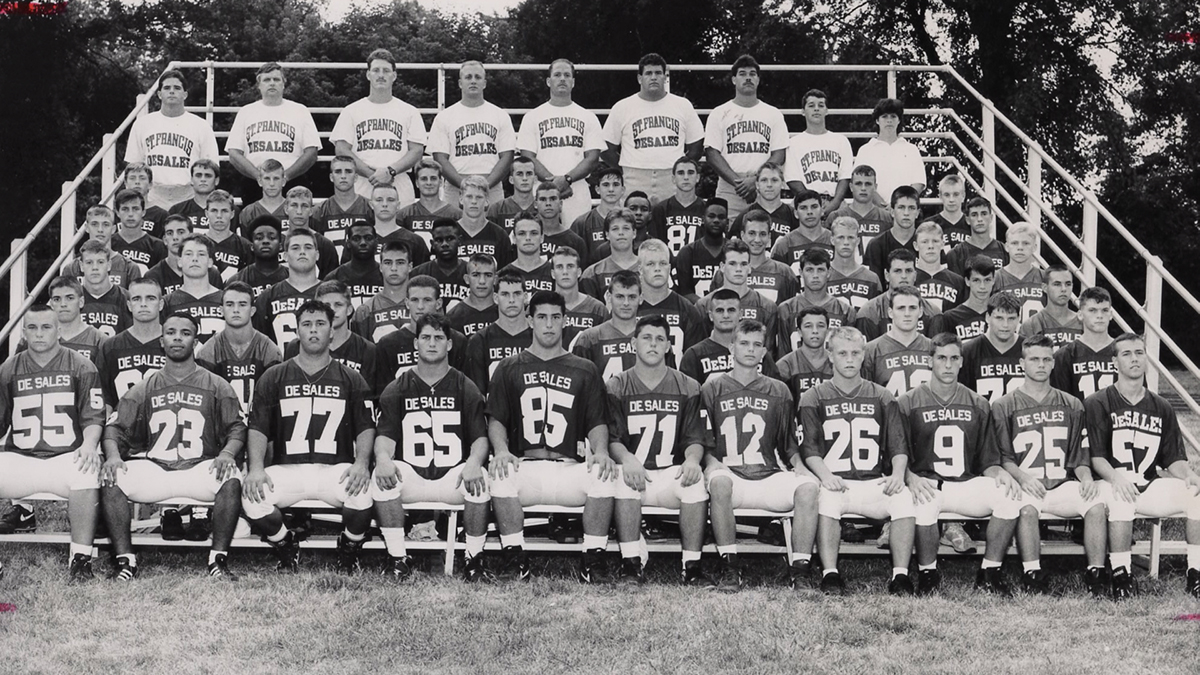
“Passion is what makes us who we are”: Fickell (first row, center, #85) as an all-state high school defensive tackle. Courtesy of Desales High School
The Saints signed Fickell as an undrafted free agent, but he tore his ACL as a rookie — requiring a second major surgery in the span of several months — and never played again.
Fickell returned to Columbus for rehab, and his old coach John Cooper offered him a graduate assistant position at Ohio State. In 2000, Fickell accepted his first full-time coaching job at Akron as a defensive line coach. He returned to Ohio State in 2002 under Jim Tressel, with whom he immediately won a national championship. He rose from special teams coordinator to linebackers coach to codefensive coordinator over nine seasons with Tressel.
And then “Tattoo-gate” happened.
In December 2010, the NCAA announced that several Ohio State players would be suspended for part of the following season for accepting improper benefits. The violations involved selling memorabilia and signing autographs in exchange for discounted tattoos from a local parlor owner, who was under investigation for federal drug trafficking. Tressel resigned a few months later while facing a suspension for failing to properly disclose knowledge of the violations.
On Memorial Day 2011, Ohio State announced Fickell, then 37, as the interim head coach. By any measure, it was his dream job. But it played out like a nightmare.
“A Lifetime of Experiences and Mistakes”
Throughout Fickell’s first year as a head coach, the football often felt secondary. He had to navigate suspensions of key players, his star quarterback’s sudden withdrawal from the university, ongoing NCAA investigations, and speculation of future sanctions.
Ohio State started the year 6–3 before losing its final four games. Despite earning a bid to the Gator Bowl, Fickell describes the season as a failure.
“We did beat Wisconsin,” he says with an ever-so-slight grin. “But that might have been the only joyful thing I can remember.”
Fickell was told a few days before the last game of the season that he wouldn’t be retained as head coach. Fearing that the news might affect his team’s performance, he didn’t tell his players or even his wife, Amy, until after the game.
In hindsight, Fickell views that difficult time as the best thing that could have happened to his career. “It was a lifetime of experiences and mistakes in eight months,” he says. “I learned an inordinate number of leadership lessons.”
When Ohio State hired Urban Meyer as its new head coach for the 2012 season, Fickell decided to return to his previous role with the program as defensive coordinator and linebackers coach — a humble move in a profession filled with ego and ambition.
“My career has always been about my family and what’s best for them,” says Fickell, who has six children ages 8 to 21. “And they were in a really good place, being close to extended family and a great community. Your ability to be humbled gives you a chance to be focused on the kids and what you need to do to continue to grow.”
For the next five years, Fickell rarely thought about head coaching. As an assistant under Meyer, he was reenergized by the details of defensive planning and the closer relationship with players. Together they led the Buckeyes to an undefeated season in 2012 and a national championship in 2014.
“One of the greatest things I’ve ever done was keep Luke Fickell,” Meyer later said.
And then the itch finally returned. Fickell started to read more about leadership. He drafted a head-coaching plan. And in spring 2016, he listened to offers with an open mind for the first time in years.
“I’m always about passion,” Fickell says. “I’m not one of those guys who say, ‘Chase your dreams.’ Everybody has dreams. You wake up in the morning, and they come and go. But passion is what makes us who we are. I felt my passion starting to shift again into developing a bigger picture, a program, a culture, an environment.”
And so Fickell followed his passion 100 miles southwest to Cincinnati. Six years later, it brought him to Madison.
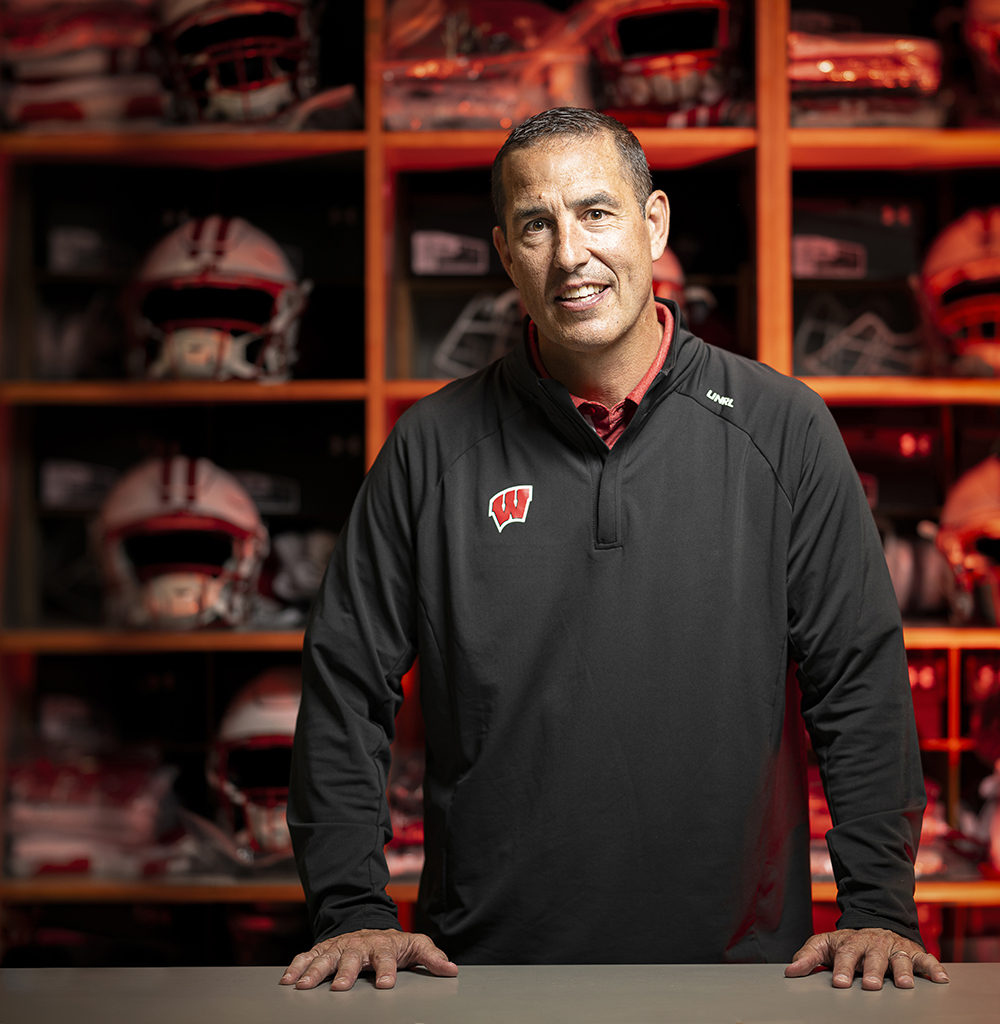
For Fickell, the key to recruiting and developing players is building honest relationships from the very first conversation. Bryce Richter
Why Wisconsin?
Fickell had been known as the coach who stayed at both Ohio State and Cincinnati. With his stock skyrocketing in recent years, he turned down high-profile opportunities at West Virginia and Michigan State.
Fickell’s modesty traces all the way back to Akron, which offered him a promotion to defensive coordinator after his first year of coaching. He turned it down, not believing it was the best move for the team. Fickell has always tried to put “the kids” first — meaning, to him, the six at home and the 120 in the locker room. It’s a lesson from childhood.
“My parents made sacrifices to give us opportunities. We didn’t have a lot,” he says. “My dad had a chance to leave to keep his job, or he’d get laid off. And he chose not to pick up and move the family. That left the greatest mark. It taught me to not just jump and run at every other opportunity.”
So Fickell did not take the career move to Wisconsin lightly. In fact, he had to leave behind his oldest son, Landon, a redshirt sophomore on the Cincinnati football team.
“It’s still one of the more difficult things,” Fickell says. “But I try to look at it as an opportunity for all of us to grow. And it’s an opportunity for him to spread his wings without his family looking right over top of him.”
And why Madison? It was the right place at the right time.
“This is a place we feel like the family can thrive,” he says. “You add that to an incredible culture, a historic football program, and being in the Big Ten, and it just all added up.”
Fickell’s hiring made a splash, given that he was the National Coach of the Year and had recently rebuffed prominent offers elsewhere.
One of Fickell’s first duties was convincing current players to keep their commitment to Wisconsin despite the coaching turnover. He repeated the message he told his son at Cincinnati: “You chose this place for a reason” — not just for the coach, but for the culture and teammates. It’s a message that resonated, including for star Badger running backs Braelon Allen x’25 and Chez Mellusi x’24, offensive lineman Jack Nelson x’24, receiver Chimere Dike x’23, and linebacker Maema Njongmeta ’23, MBAx’24, who are all returning this season.
Longo, the veteran offensive guru whom Fickell initially tried to hire at Cincinnati, has successfully used the transfer portal to fill holes in the roster and prep the dynamic Air Raid offense. New faces include starting quarterback Tanner Mordecai MSx’24 and receivers Bryson Green x’25 and C. J. Williams x’26.
Expectations for the new-look Badgers are sky-high among fans and pundits. Inside the Camp Randall locker room, they’re even higher. Fickell demands it.
“He wants the team to be physically tough, mentally tough, with great attitude and effort all the time,” Longo says. “A lot of people talk about those things, but he coaches it, he preaches it, and we practice it.” •
Preston Schmitt '14 is a senior staff writer for On Wisconsin.
Published in the Fall 2023 issue

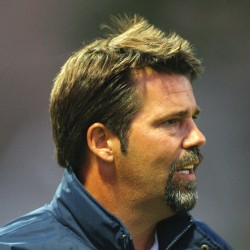

Comments
Foxy September 9, 2023
Bring back Jim Leonhard
John Smith September 9, 2023
Good win!